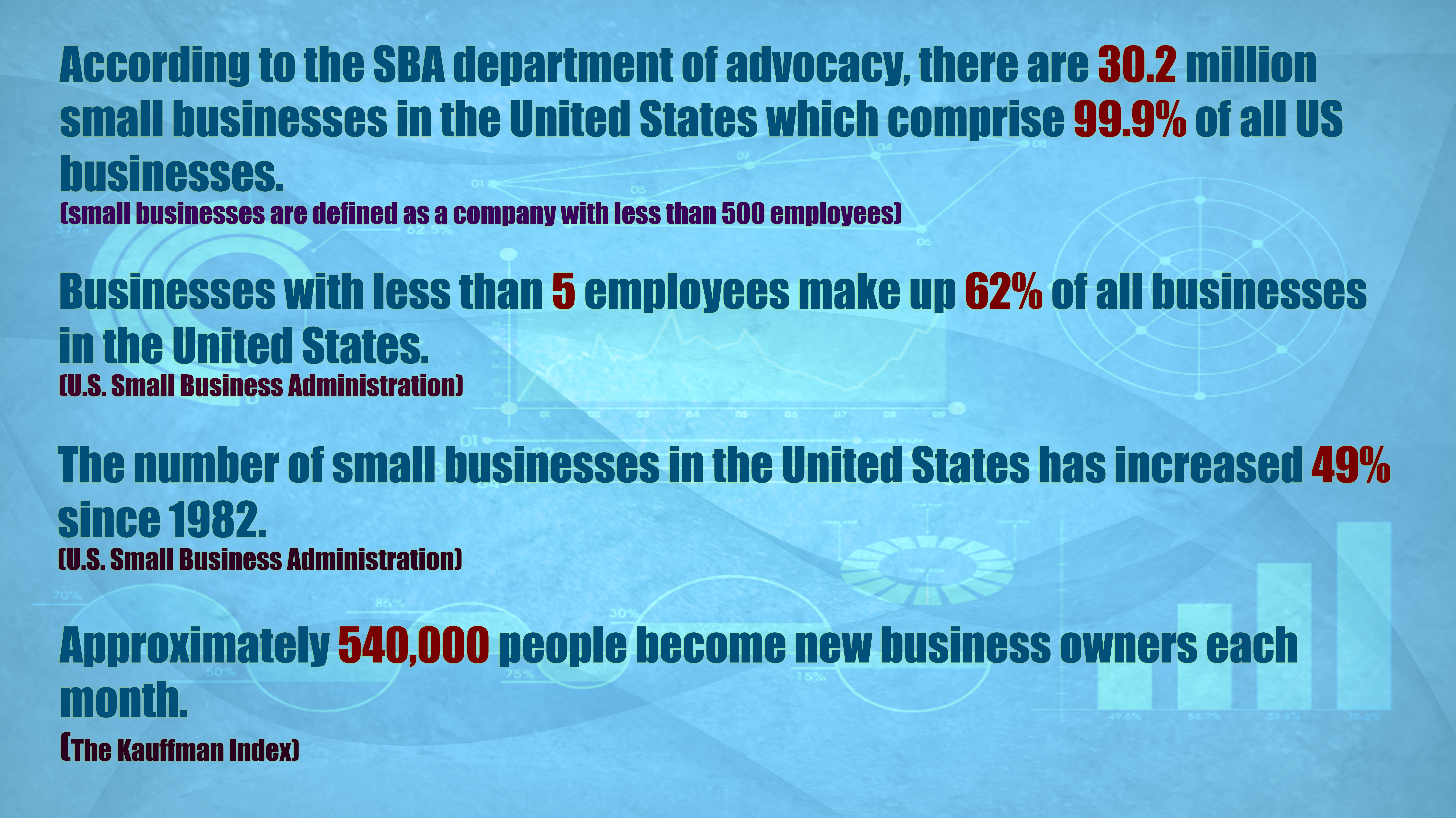
You have a fantastic idea for a business that can revolutionize the world, or perhaps the world in your immediate vicinity. However, starting a business can be quite daunting if you have no idea where to begin. One of the best ways to organize your thoughts and streamline your vision is by taking the time to make sure you are fully prepared for what’s ahead.
Small Business Owners US Statistics

- According to the SBA department of advocacy, there are 30.2 million small businesses in the United States which comprise 99.9% of all US businesses (small businesses are defined as a company with less than 500 employees).
- Businesses with less than 5 employees make up 62% of all businesses in the United States (U.S. Small Business Administration).
- The number of small businesses in the United States has increased 49% since 1982 (U.S. Small Business Administration).
- Approximately 540,000 people become new business owners each month (The Kauffman Index).
5 simple questions – Are You Ready?
When you consider some of the most popular reasons to start a business, including having a fantastic business idea, creating an opportunity that has the potential to grow with you, working toward financial independence, and investing in yourself — owning a small business is the way to go!
A start-up business is a challenge and requires a special kind of dedication, perseverance, and commitment, not to be compared to running a business, which is an entirely different set of disciplines to consider and maintain. While it’s difficult to plan for every possibility and obstacle that may occur, you can find yourself on the path to success by asking yourself a few simple questions.

- What are my goals?
Plan your strategy, devise a roadmap detailing every piece of your business from making your first phone call until you are open for business and beyond. Without a clear understanding of where you plan to go and how you need to get there. You may find yourself struggling through the development of starting your business and facing unwanted stress and frustration.
One of the most important factors is setting goals outlining what you want to accomplish in the short term (between one to three month), as well as over the long term (two years, five years, etc.). Once you have set your goals, start creating a plan for your business that will help you along the way. It’s also helpful to understand your motivation for starting a business in the first place.
2. What are the laws and regulations for my business?
It is always a good practice for anyone who ventures taking over a business to seek professional advice. There are several legalities that you should consider when starting a business. Here is a list of some of the legal areas you should explore:
- Deciding on the structure of your business (sole proprietorship, partnership, corporation, limited liability company)
- Registering a business name
- Obtaining necessary licenses and permits
- Planning for business taxes
3. What are the financial implications of starting my business?
Money is a major concern when you start a business, especially if you are leaving behind a steady paycheck and if your business has significant start-up expenses. Consider how much you will need for the initial start-up (permits, equipment, furniture, inventory, training, etc.…), include expenses for a period of time allowing the new business to start generating revenue, which could be between six months to a year.
Once you have calculated your total for financial need, it’s time to find the money. You have options from family and friends to SBA loans, capital investors and even yourself with a self-directed 401(k) plan. The key is to know how to acquire the funds to invest in your business, that will be predicated on how well you write your business plan, and how much you have available to invest.
4. Can I do this alone?
For most people, they probably would answer yes to this question, but believe me; they may have not started or owned a business of their own. Most current business owners would more than likely say no and for a good reason. The more support you have the better opportunity your business has for success.
Starting a business will take a lot of your time, including personal time from family. One of the greatest motivations for a business owner to succeed is support. Not only family support, but as mentioned above professional support as well. Create a network of trusted advisors, such as an accountant, and attorney which can supply you with compliance and legal advice. Vendors and peers are a viable asset becoming influencers, which are a boost to your reputation management.
5. Am I an astute Leader?
An astute leader has a number of qualities that make you a strong and effective small-business owner. Being astute simply means to be aware and thorough in continually analyzing conditions and acting accordingly to achieve positive desired outcomes.
Being an astute business owner requires you to be an effective communicator with an exceptional mix of personality and character traits. Though there isn’t a simple recipe that makes one individual more successful than another, some personality traits that can ease the process of getting started as a business owner includes passion, drive, dedication, and self-discipline.
Are You Ready to Start your Business?
All five of these questions are necessities for starting a successful small business. And all five of these questions must be fully fleshed out before you start a business. Are you a goal-oriented person willing to fully commit to starting and running a successful business? Have you figured out where to get the business start-up money you need to secure your financing? Do you have the business knowledge, advisors and the support system to help you do what you need to do to be successful? Then go for it! You’re already well on your way to small business success!
Are you interested in learning more about DRDA’s ROBS structure, the BORSA™ Plan? Give Suzy a call today at 281-954-6023 for a free consultation.






